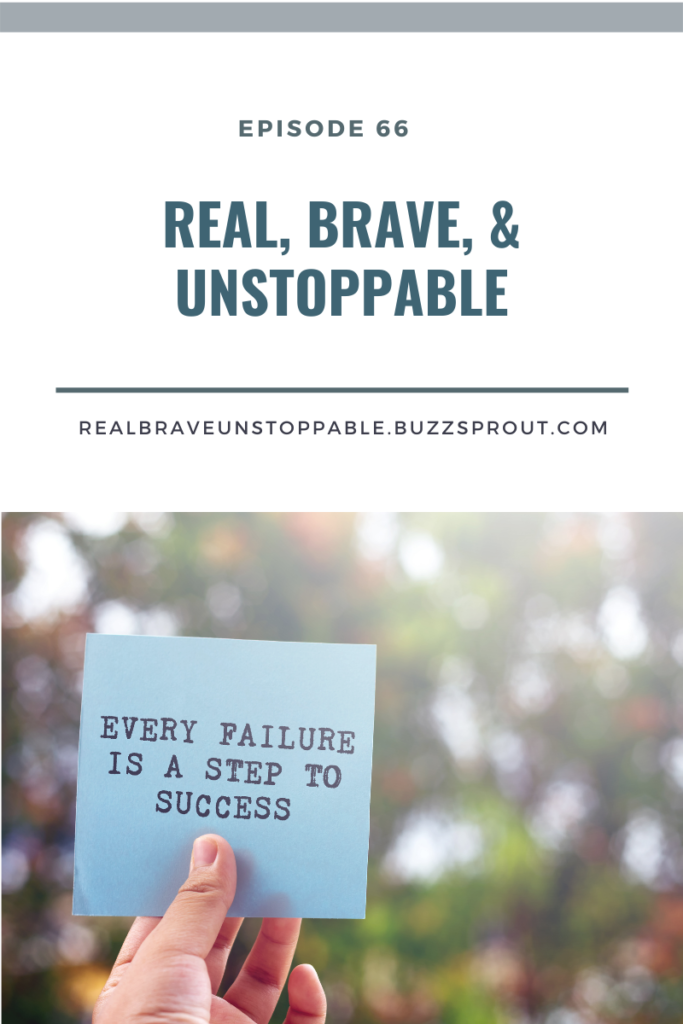
Listen to more episodes of Real, Brave, & Unstoppable on your favorite streaming platform!
APPLE PODCASTS | SPOTIFY | STITCHER
How are you at dealing with failure?
When dealing with failure, do you let it roll off your back and try again?
Or, do you make it mean all kinds of things about who you are how worthy you are?
The fear of failure can be crippling! In this episode of Real, Brave, & Unstoppable, I’m discussing my take on failure and why I don’t believe it’s even a thing.
Have you downloaded my free e-book yet?
Download How to Create a Life You Love: Building a Vision HERE!
In this free workbook, there are a couple of exercises for you to get honest with yourself about how satisfied you are with your life right now as well as an opportunity to dream big and create a vision for where you want to be.
Don’t miss it!
Let’s Talk!
Do you have questions about what I’m doing “behind the curtain”? Maybe you’re curious about how coaching can help YOU, or maybe you have a question about one of my podcast episodes. Maybe you just want to say HI!
Well, whatever your reason, I’d love to chat. Click HERE to schedule a time.
Episode 66 Transcript
Ep 66: fear of failure
[00:00:00] Hello, and welcome back to real, brave, and unstoppable. Thank you so much for tuning in with me today. This is episode 66.
[00:00:11] Today I’m going to talk about the fear of failure. There are going to be some interesting concepts that I’m going to ask you to consider, and we’ll get to that later, but hope you enjoy this episode. Let’s dive in.
[00:00:26] So a lot of times we think of perfectionists when we think of the fear of failure. I am a recovering perfectionist myself, and it’s kind of counterintuitive
[00:00:37] because we tend to see them as overachievers from the outside and doing things really well. But a lot of perfectionists (and it’s not just perfectionists… I’m just using this as an example) have a very intense fear of failure. And that failure can hold you back in a lot of ways.
[00:01:00] So I’m going to tell you a story about a client of mine, let’s just call her Sarah. I was helping Sarah with her vision for her life and really creating a life that was inspiring to her because she felt pretty stuck. And so as we worked on some of the things that she dreamed of doing in her life, she came up against a lot of fear, a lot of resistance.
[00:01:23] We were working through a lot of the disempowering beliefs she had that caused this fear of failure, and in particular, Sarah was a “self-sabotager” and she was so afraid of not succeeding at things that she would do things that would sabotage her chances of succeeding. She’d have an excuse to say
[00:01:47] this is why I didn’t do that, or this is why I wasn’t successful at that. This really kept her safe because she was able to say things like if only this would have been in place, then I would have succeeded.
[00:02:00] And that was, as you can imagine, really frustrating for Sarah because every time she would start to get close to something, she would self-sabotage it because she was so afraid to not succeed at it, which is really ironic if you think about it.
So, what exactly is the fear of failure? Let’s talk about that first. It’s more than being afraid to do poorly. It’s really attached to self-worth and the belief that you aren’t good enough. Failure
[00:02:29] will tell you you’re not good enough. It defines you. It defines your self-worth. It’s also a reaction to the idea that you’re inadequate if you fail. And it also involves a lot of worry, a lot of negative thoughts and emotions, and avoiding taking steps towards completing something. Fear of failure keeps you from trying and it creates a lot of self-doubt.
[00:02:55] Fear of failure is basically failing ahead of time because you have the same outcome. If you’re afraid of failure and you don’t try something. Well, you haven’t done it so you’ve failed in a sense. If you do it and fail, well, this is the same outcome. So, if you’re afraid of it and you just don’t try because you’re afraid, you’re just choosing to fail ahead of time.
[00:03:23] The fear of failure can come from
[00:03:27] Disempowering belief systems that we’ve attached to all throughout our life. A lot of them happen in childhood we develop this need for validation. We get afraid that if we don’t perform or if we don’t succeed, we’re not going to get that validation. Failure is so humiliating for perfectionists that they don’t even try. So, they create this little safe comfort zone and they’ll do what they’re comfortable doing, what they know they can do
[00:03:57] but they have a really hard time leaving their comfort zone. Two weeks ago we talked about what to do if your life doesn’t feel exciting. And so here, perfectionism, that’s a surefire way to get into a place where your life doesn’t feel exciting because you’re so afraid to leave your safe zone.
[00:04:16] Fragile self-confidence is another thing that can cause the fear of failure. People who have true confidence, they know they’re not always going to succeed. So, they try new things because whatever. It’s no big deal. They know they’re going to fail at some point, so why not try?
[00:04:33] But the people with fragile self-confidence – where succeeding or failing defines their worth, they play it safe like a perfectionist.
[00:04:42] So I want you to think right now of some ways that you fear failure. If that’s a thing for you or not. And if it is, I want you to think right now of some ways that the fear of failure holds you back from living a kick-ass life.
I’m going to list off a few things for you.
[00:05:03] One is avoiding projects or opportunities and maybe even other people if we’re afraid of judgment.
[00:05:12] It causes us to have low self-esteem and low self-efficacy. That’s a hard word to say (!), but it means your belief in your own abilities.
[00:05:21] If we have a low belief in our ability, that means we don’t trust ourselves. That really erodes our self-esteem as well.
[00:05:30] It makes it harder to be resilient, which means that you bounce back when things go wrong.
[00:05:36] If you’re afraid of failure and you fail at something, which I don’t even believe in the word failure. We’ll get to that in a minute, but if you don’t succeed at something or things don’t go your way, then you’re probably not going to try it again if you’re afraid of failing. So, you miss out on a lot.
[00:05:54] It also really causes people to underachieve. I talked about the safety zone, comfort zone. People stay there and they don’t get out. So, they’re not really living up to their full potential. And when I say living up to your full potential, I don’t mean like in the way of, you know, having to be an overachiever. I just mean having a happy life, living a life that’s inspiring and purposeful.
[00:06:18] The fear of failure also can create, like I mentioned, with my clients, self-sabotaging behavior. Like procrastination is one example of that, or purposely giving something very little effort in order to have an excuse for failure. Like, oh, I wasn’t really trying.
[00:06:38] Or something to blame other than the lack of ability. It’s a safety measure. It’s something that we can say, oh, I wasn’t really trying that hard. I could do it. If I put everything into it. You know, having something else to dump off, you know, not take responsibility for the non-success.
[00:06:58] When it comes down to it, there are really two types of responses to things. One is fear-based responses. And second is love-based responses. Fear and love. We can boil a lot down to that. And fear triggers a loop. There’s a trigger or a cue,
[00:07:24] which causes you to do a certain behavior. And then you get a reward from it. Your trigger would be the thing that you’re afraid of. And your behavior would be to back off, procrastinate, self-sabotage, or do your perfectionist things or people please. Pessimism is also a fear response – oh, it’ll never work anyway. So why try?
[00:07:50] Those are like the four main ways of dealing with fear, that’s your behavior. And practicing that behavior gives you some kind of reward. And usually, it’s taking the edge off of that stress you’re feeling from the fear, the trigger, the cue. The good thing is that we can work on that in between the behavior. We can change that behavior.
[00:08:15] So that’s pretty good news, right? But I do want to address one thing. This might be an unpopular opinion in the world of overachievers (I used to be one of them),
[00:08:38] but I really believe there’s no such thing as failure. There’s only learning.
[00:08:43] So we need to overcome this and not worry so much about failure. We are going to fail. You’re going to fail at something in your life, right? There’s no way you can get through life without failing at something.
As long as we get up again, there’s no such thing as failing. You know, even if we decide not to pursue something, that doesn’t make it a failure. It just means that we decided not to continue. And there’s also learning in that.
[00:09:20] I strongly believe this.
[00:09:25] So, how do you get past the fear of failure? You need to get past it if you want to have a life that’s expansive and joyful and purposeful. There are many fears you have to get over, but this is a big one. So, at the heart of the matter is really a lack of love. Like I said before feelings really either come
[00:09:50] from love or fear. And the emotions that come from fear of failure are often frustration and adequacy and worthiness. These are fear-based emotions. Emotions that come from love are compassion, kindness, caring, nurturing, you get the idea. I really think that loving yourself unconditionally or at least beginning, this journey is really key for ditching the fear of failure.
[00:10:15] If you love yourself, you’re going to be able to handle, not succeeding at something because you can offer yourself love and compassion. And that eliminates the fear of failure because it’s in the space of love and compassion, where you understand that you are enough. And the worst thing you’ll ever have to handle is a negative emotion. And you can
[00:10:35] totally handle that. Because emotions come and go. If you just sit with an emotion, it will be there and then it’ll roll away. And another one will come along.
[00:10:44] Self-love is a topic in and of itself. So today we’re going to focus on some more practical aspects.
[00:10:50] So the first one is to notice. Your thoughts, feelings, and actions.
[00:10:59] Understand, why are you afraid of failing? What’s your story? For me, I think it was really if I fail, I’m not worthy of love and attention when I was growing up. All I wanted was to please, my dad so badly, and my dad was really hard on us as kids. Looking back, I don’t blame him for that because I think, you know, we all do the best we can, and each generation I really believe improves upon the last one.
[00:11:28] I think I just always personally, I always wanted to, to gain approval from my dad and I didn’t ever feel like I did. Now, that was my experience. And we all have different perspectives. So, to be clear, I’m not blaming my dad or even saying that he didn’t give me love and attention because I’m sure he did. It was just my perspective at the time.
[00:11:51] And that was my experience. I know my dad loved me. And as a parent was just doing the best he could like we all do.
[00:11:58] But it’s good to pinpoint that story of, I’m afraid of failing because if I fail, I’m not good enough. Can you pinpoint where it came from?
[00:12:05] Fear is just a belief in your head.
[00:12:09] It’s why you can take one situation and it could scare someone and it might not scare someone else at all. It’s because of all the beliefs that we have in our head. The thing is with beliefs that are in our head, we created these belief systems. We don’t have to believe them because they’re not necessarily true.
[00:12:31] There are some beliefs we have that are true and we want to keep them because they are true for us. But fear generally is not one of those things, unless it’s, you’re in danger. Of course.
[00:12:41] So when you can identify why you think you’re afraid of failing, identify your story, look at your perspectives, It’s also useful to identify how fear impacts that behavior piece of things. You know, if you’re over striving and working really hard not to achieve success, but to avoid consequences you think might happen if you fail,
[00:13:02] that’s a behavior. How does the fear impact the behavior? It makes you over strive and work frantically instead of just believing in yourself and knowing you’ll do the best that you can do and then deal with the consequences. If your work isn’t good enough.
[00:13:19] Another example is engaging in self-protective behaviors like procrastination or avoidance. To give yourself a way to explain away that failure. I talked about that before. It’s just an excuse like, oh, I didn’t get to that.
[00:13:34] Or, I didn’t know it was happening. These are excuses that you can, you know, blame your lack of success on.
[00:13:42] Once you’ve identified those behaviors, that middle piece of the loop. You can work on changing them, but you need to know what the issue is before you can start to work on it. And that’s a lot of work. I do a lot of that work with my clients and it’s such, it’s a game-changer. The next thing is to just shift your perspective, develop a new perspective about your fear of failure. It’s not an absolutely like life-destroying chaotic disaster, right?
It doesn’t have to be. It’s only that way because you’re making it, it’s the belief in your head. So, develop a new relationship with it. And that’s going to take the power of that fear away right now. You’re giving your power away to it. If you’re afraid of failing. And it’s hindering you from
[00:14:26] being your best self. So, work on that perspective – is it really that bad? Possible thinking shifts might be:
First of all, failure is feedback. It’s a chance for you to incorporate what you learned to
[00:14:41] learn and grow, right? It can be a lesson basically. You can reflect on past mistakes and
[00:14:47] find benefits. And that can help you be more open to seeing failure as a teacher. You can also think about it as a doable challenge that gives you an opportunity to move forward instead of it being a roadblock that stops you in your tracks. The challenge being
[00:15:05] that fear – if you can turn it into a prompt to notice, oh, this is just my friend fear. and now you’re being challenged to step through, taking the fear with you.
Fear will always be there – always. Fear is always going to be there. So, you just need to learn how to carry it with you and have the courage to do that.
[00:15:31] You can also think about fear as a fleeting situation. It’s not permanent. It’s not going to end your path permanently.
[00:15:40] And also along with thinking shifts, shift the thoughts about yourself. Focus on what are your strengths and your talents instead of thinking only about all your flaws and shortcomings. Put a positive spin on it. And then work on your belief in yourself and your capabilities. This is really key.
[00:15:58] And again, this is stuff I work with my clients on. To really work on self-love. This enables people to believe in themselves when they know they have their own back, when they love who they are they can step through life authentically.
[00:16:17] They learn how to trust themselves. And when they learn how to trust themselves, they know they learn how to believe in themselves as well.
[00:16:26] And when you believe in yourself, you’re not afraid of fear because you know, you can handle whatever the outcome is!
[00:16:32] The next one is to give yourself permission to fail. Like I said before, you’ll fail sometime in your life. If you haven’t already, you’re probably in the 0.0000000001%. You will fail at something.
[00:16:51] And if you give yourself the permission to fail, it can be kind of liberating. It can be scary at first. But it is pretty liberating once you just acknowledge that you’re afraid, and yourself the permission to be afraid and fail. It’s all fine.
[00:17:12] You’ll learn something.
[00:17:14] Look at your thoughts and feelings about failure.
[00:17:18] So. You can ask yourself. What’s the worst possible outcome. If I fail at something. Would I survive? You’ll probably discover that while it might kind of suck, you’d probably survive your worst-case scenario just fine. So it puts things in perspective to think about this.
Be kind to yourself while you’re yourself permission to fail and going through these worst-case scenario
[00:17:46] things because it can be a little stressful. It’s a shift in your way of being that you’ve held for a very long time. Also, watch that harsh inner critic voice. That voice is just, it can be so mean. And it’s going to try to stop you. From
[00:18:03] losing your fear of failure. It’s going to want you to hang on to that. So just know that and what you can also do is when, if you can start to notice that voice coming in, you can say, oh, that’s just my inner critic. Okay, inner critic. You can come with me, but I’m still going to do this. I don’t really need you to screw this up for me.
[00:18:21] And like I said, giving yourself permission to fail. It’s scary at first. It’s very unknown territory. So use breathing or other relaxation techniques or you can journal about it. You can meditate.
The next one is to take control of the situation – of yourself. Take control of what you’re doing in this situation.
[00:18:46] You can break things down into more manageable chunks. You can reflect on parts that did go well and things that are within your control and you can let go of what isn’t in your control.
[00:19:00] You can also
[00:19:01] feel a sense of control by looking at what your typical habits are when it comes to doing something, what works well for you? What gets in your way? Choose more of what works for you, obviously. And troubleshoot what doesn’t work. What could you do instead? That would be more helpful. This is all going to help you feel in control of yourself. And this can be super motivating and empowering.
[00:19:26] Mindfulness is another thing. A lot of times, fear of failure comes up because we’re not really paying attention. And when you start to really notice a that’s super helpful, just the awareness is a huge step. Like I always say awareness is half the battle, but if you’re worried about what might or might not happen in the future, like failing.
[00:19:45] You’re not in the present moment and you want to be in the present moment always because you might be worrying about something that’s not going to happen. Remember your worst-case scenario – your worst-case scenario is probably not going to happen.
And failure is not black and white either.
[00:20:02] But as you’re in the present moment, start to notice the thoughts and the worries that come up and remember the thoughts that you have are not always true. Just because you think them does not mean they’re true. So, look at the thoughts, like be the observer of them, look at them differently instead of thinking, oh my God, I’m going to let everyone down. If I don’t do this right.
[00:20:20] I just think. I’m just having the thought that I’m going to fail and let everyone down. And that thought isn’t true.
[00:20:28] You can redirect your attention by focusing on something in the present moment if you feel like you’re getting into fear and worry. So pay attention to something you see or hear, or feel, or smell or even taste.
[00:20:43] Take some slow, deep breaths. That switches off your sympathetic nervous system, which is your fight or flight mechanism. And it activates the parasympathetic nervous system, which allows you to feel calm and focused, which is what we want in the situation.
[00:20:59] Another one that is super helpful for people I’ve found is to go look for stories about others who have failed and bounced back. Here’s a quote from Thomas Edison: “I didn’t fail a thousand times. The light bulb was an invention with a thousand steps.” Like what a great reframe.
[00:21:19] van Gogh sold one painting during his life. And it was to the sister of one of his friends for the equivalent of about $50. But this didn’t stop him from completing over 800 paintings in his lifetime. Crazy right.
J K Rowling, the author of Harry Potter, was rejected by 12 publishers before a small London publisher picked up the first Harry Potter book. It’s crazy. And now she’s so successful. Michael Jordan was cut from his high school basketball team. Michael Jordan, like one of the greatest of all-time basketball players. He said I failed over and over again in my life, and that’s why I succeed.
[00:22:08] That’s another amazing reframe. You learn so much from failing and you can become better than people with just tons of raw talent.
[00:22:19] Another one that I really love is to envision the outcome that you do want, not what you don’t want. So, instead of seeing what happens when you fail, visualize what happens when you don’t fail? The law of attraction doesn’t distinguish between negative versus positive thoughts. Whatever you think about you’ll attract into your life. And I, I was a skeptic for a long time, but I have seen this in action more times than I can even tell you.
So, what you need to do is you need to think about what you do want, and it can’t be I never want to fail. It must be something like I see myself doing a good job and succeeding, or I see myself enjoying this or whatever it is, but you want to think of how you see yourself and think about
[00:23:14] is your future self, the person who is not afraid of failure. How does that person act? How does she think, look, how does she eat, exercise? All the things and you become that person gradually every day. You embody him or her.
[00:23:40] It’s abundant thinking instead of scarcity thinking
[00:23:44] So the last one I have is to feel the fear and honor the feelings
[00:23:49] but move through it anyway. I was at the University of Maryland football game a couple of weeks ago – my son’s in the marching band there – and while we were sitting there and watching the game I noticed at the end of the field, there were two big Under Armour banners that said, the only way is through. It’s so true. The only way is through. You can be afraid, but the only way through it is to just go through it.
[00:24:12] You feel fear because of the unknown and uncertainty. And you don’t trust that you’ll get through it. As humans, we always want to wait to know things are going to work out before doing, but that’s not how it works. You actually need to do the thing to gain confidence in yourself that you can, which will turn into belief, and you need courage to do the thing. So, you need courage to bring the fear with you.
[00:24:41] And when you do that, you’ll gain confidence in your ability to get through anything. And even the things that don’t work out so well.
I’m going to read you three quotes that I love before I wrap up. The first one is by J K Rowling.
“Failure in life is inevitable. It’s impossible to live without failing at something unless you live so cautiously that you might as well not have lived at all. In which case you fail by default”.
[00:25:08] And that’s what I was saying about failing ahead of time. Exactly. You want to live this one life – it’s meant for you to live it. There’s a life that’s just waiting to be lived through you.
The next one is by Will Smith.
“Fear is not real. The only place that fear can exist is in our thoughts of the future. It’s a product of our imagination causing us to fear things that do not at present and may not ever exist. That’s near insanity. Do not misunderstand me. Danger is very real, but fear is a choice.”
[00:25:43] I have two more. This one is from Les brown. If you don’t know Les brown. You’ve got to go Google him because he’s like one of the best motivational speakers ever.
[00:25:54] “Too many of us are not living our dreams because we are living our fears.”
So good. And then the last one I have is from good old Albert Einstein. Obviously, a genius.
“A person who never made a mistake. Never tried anything new.”
My daughter is so worried about not being good at stuff when she has only done it like one time and I’m trying to impress upon her that when you’re trying something new, you have to be willing to fail. You have to be willing to be bad at it. Or you’re just in your safe zone. We don’t want to be that.
[00:26:29] I say this all the time. And I say it to my kids all the time and they roll their eyes at me every time.
[00:26:36] Outside of your comfort zone is where the magic happens.
So if you’re afraid of failing, acknowledge the fear.
[00:26:47] Take that step. Take a step towards it. Practice courage. Do the thing. You’re going to find it’s not as bad as you think.
I hope this was helpful. If you have any questions, feel free to reach out to me.
[00:27:02] If you’re enjoying the podcast, I would love it. If you would go leave me a review and a rating. On whatever streaming platform you’re listening on. And if you would share it with a friend that would be amazing. All right. Have a great week. I will see you next week.







